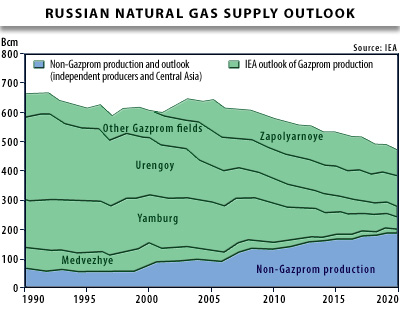
The New York Times features an article today by Andrew E. Kramer concerning Russia’s gas worries. Kramer explains that as gas prices (not to be confused with oil prices) fall, Russia’s state-run gas company Gazprom will suffer. The main reason is because Gazprom is contractually obligated to purchase gas from its Central Asian former-soviet neighbors at high prices.
Example:
Because of Gazprom’s contracts with its neighbors, Russia has been forced to close many of its domestic gas fields due to reduced demand for gas, which will drop this year by 60 billion cubic meters globally (according to Jonathan P. Stern from the Oxford Institute for Energy Studies).
The drop in demand and prices directly impacts Moscow’s revenue. Gazprom is the largest taxpayer in Russia. It payed about $40 billion in taxes in 2008 but that number is expected to drop to $22.5 billion in 2009.
All of this spells crisis for Russia’s budget and domestic gas production economy. And the hardest hit will be Russian citizens. Yesterday’s report from the Russian Federal Statistics Service revealed that country’s economy contracted by 9.5% in the first quarter of 2009. This indicates a degree of failure of PM Putin’s stimulus package and has led President Medvedev to criticize his senior ministers for their lack of attention to diversifying the Russian economy.
Russia’s southern neighbors, such as Turkmenistan and Azerbaijan are no doubt keenly aware of Russia’s current purchasing power vulnerability and financial weakness. Some might even be expecting Gazprom to renege on some of its contracts in order to bolster domestic Russian gas production. As gas production and revenues fall, the window continues to open wider for the EU’s Nabucco Pipeline plans. It seems natural to expect Nabucco to continue to develop provided prices and demand remain low for Russian gas.